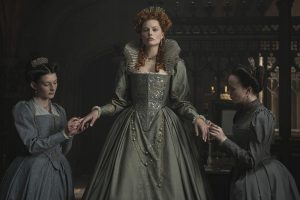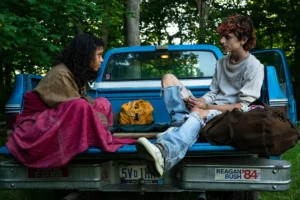There’s a scene in Little Women where the shy and gifted Beth March (Eliza Scanlen) enters the quiet Laurence mansion to play the piano. The home’s patriarch, Mr. Laurence (Chris Cooper), sits hidden on the stairs listening to her play, moved to tears by the memory of his deceased daughter whom Beth reminds him of. Her music both saddens and comforts him, bringing noise to an empty household, filling the void left by his daughter’s absence. It’s the aching of loss, a past that can never be recovered, and the hopefulness of a better days ahead that is etched within every frame of Little Women.
When Greta Gerwig announced that, following the success of her solo directorial debut Lady Bird (2017), she’d next be writing and directing an adaptation of Louisa May Alcott’s famous novel Little Women, there was collective bewilderment. Why choose a book written in the 1800s that has already been adapted several times in several different mediums? What more is there to say?
However, it is clear from the moment the film starts that this was Gerwig’s passion project. It is her love letter to Little Women author Louisa May Alcott, the art of writing, and to the creation of art itself. It is her gift to the world.
Little Women follows Jo and her three sisters, Meg, Beth, and Amy, as they come of age during the American Civil War. Told non-linearly, the film opens s in the middle of the story with the four sisters separated, navigating adulthood and jumps between the past and the present throughout. Each time leap is edited seamlessly, with the cold blue’s of the present contrasting with the warm hues of the past—a past filled with family, love, and laughter eventually replaced with a somber vacancy.
These contrasting sentiments are captured perfectly in Alexandre’s Desplat’s score. The whimsy of childhood mixed with the reflective nature of growing up into adulthood beautifully syncs with the passage of time. It all flows together seamlessly.
Gerwig’s script is masterful. She takes such care to make sure each character is fully realized, a trait she carried over from Lady Bird. Supporting characters, like the aforementioned Mr. Laurence, have complete arcs that make them feel like fleshed out people rather than just props for Jo’s story.
This is no doubt strengthened by phenomenal performances across the board from the supporting cast. Meryl Streep is hilarious as the stern Aunt March. Laura Dern is the emotional center for the sisters as their nurturing mother in her best performance of the year. As Laurie, Mr. Laurence’s grandson and close family friend of the March’s, Timothée Chalamet is simultaneously heartbreaking and alluring. Laurie long’s for the familial comfort of the March family and Chalamet’s performance sells this with an intimate subtlety.
For the sisters, not a single actress misses a beat. Emma Watson was a particularly genius casting choice for Meg, a character meant to have this familiarity and motherly nature. For many of us who grew up with Watson as Hermione Granger in the Harry Potter series, we recognize and feel comforted by her presence on screen.
Likewise, Eliza Scanlen is perfect as shy, kindhearted Beth. Scanlen’s vulnerability makes her arc that much more heartbreaking. As Amy March, Florence Pugh is divine. Aided by Gerwig’s careful writing, she adds a new understanding and likeability to a character typically villainized. She plays both the immature child and the graceful adult with ease.
But, make no mistake, this is Saoirse Ronan’s film. As our protagonist Jo March, Ronan is electric. She fills the screen with a restless energy and boundless passion, overwhelming the audience with her vivacity. She simply is Jo March. She ties the film together in what is quite possibly the best performance of her career.
In one scene, Jo gives a monologue expressing her desire to be loved. “I care more to be loved.” she says, “I want to be loved.” Ronan delivers this monologue with a desperation that is palpable and worthy of awards. Jo’s loneliness and longing to be surrounded by love is understood because we have been transported back in time to the nurturing atmosphere of her adolescence. That love feels like it’s missing in the present.
But, in the end, that’s the beauty of Little Women. As Jo rediscovers her love for writing, something she also thought was lost, she writes the story of her sisters. That warmth, is still there—it just needed to be found again. In this film the act of writing itself is so intertwined with acts of love.
It is rare that I leave a theater so inspired. Little Women is a film that makes me want to tell my own stories. It’s a plea for creatives to work on their passion projects. There is a moment where Jo says that her novel wouldn’t matter to the world because there’s no stories like it. Amy argues back that it would matter for that precise reason. The act of writing her story makes it matter.
Little Women is infused with love. From playful touches between family and friends, to the way the story alternates between past and present. This film is a love story. But it isn’t one of romance. It’s a love story between a girl and her work. Jo’s novel is a love letter to her sisters, her family, her upbringing.
In the last act of the movie, there are shots of the sisters as young girls playing in the attic, the colors warm, the laughter loud. These shots are juxtaposed with the creation of Jo’s novel and as she holds her work tightly to her chest, close to her heart, you can feel the love through the screen. The love that she has for her story—the story of the March sisters.






